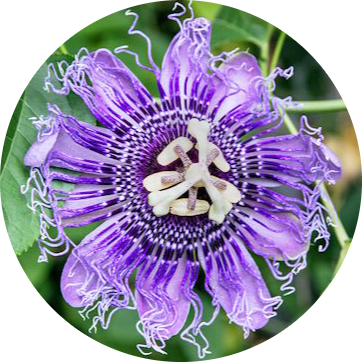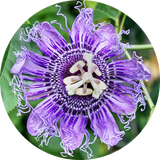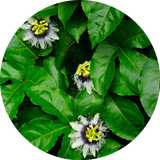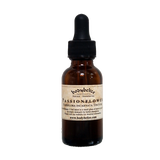- PLANT MEDICINE
- >
- Tinctures
- >
- PASSIONFLOWER TINCTURE
PASSIONFLOWER TINCTURE
Family: Passifloraceae
Genus: Passiflora
Species: Passiflora incarnata
Synonyms: Maypop, apricot vine, passion vine
Common Names: Passionflower, Maypop
Parts Used: Leaves, flowers
Main Actions: Anxiolytic, sedative, hypnotic, antispasmodic
Other Actions: Analgesic, hypotensive, nervine tonic
Description: Passionflower is a climbing vine with beautiful, intricate flowers and edible fruit. It typically grows in warm climates.
Tribal and Herbal Medicine Uses: Used traditionally for anxiety, insomnia, hysteria, epilepsy, and neuralgia.
Plant Chemicals: Flavonoids, alkaloids (harman, harmaline), glycosides, coumarins
Biological Activities and Clinical Research: Demonstrated anxiolytic and sedative effects in various studies. Also shown to have antispasmodic properties.
Current Practical Uses: Widely used as a natural remedy for anxiety and sleep disorders.
Main Preparation Method: Tea, tincture, capsules
Main Actions (in order): Anxiolytic, sedative, hypnotic, antispasmodic
Main Uses: Anxiety, insomnia, nervousness, muscle spasms
Properties/Actions Documented by Research: Anxiolytic, sedative, antispasmodic
Other Properties/Actions Documented by Traditional Use: Analgesic, hypotensive, nervine tonic
Cautions: Generally considered safe, but caution advised in pregnancy and breastfeeding.
Traditional Preparation: Infusion or decoction of leaves and flowers, sometimes combined with other calming herbs.
Contraindications: Avoid use in pregnancy and breastfeeding without medical supervision.
Drug Interactions: May potentiate the effects of sedatives and CNS depressants. Use caution when combining with other medications.
Recommended dosage: 2.5ml taken in a small glass of water or juice 2 x daily on an empty stomach for better absorption.




